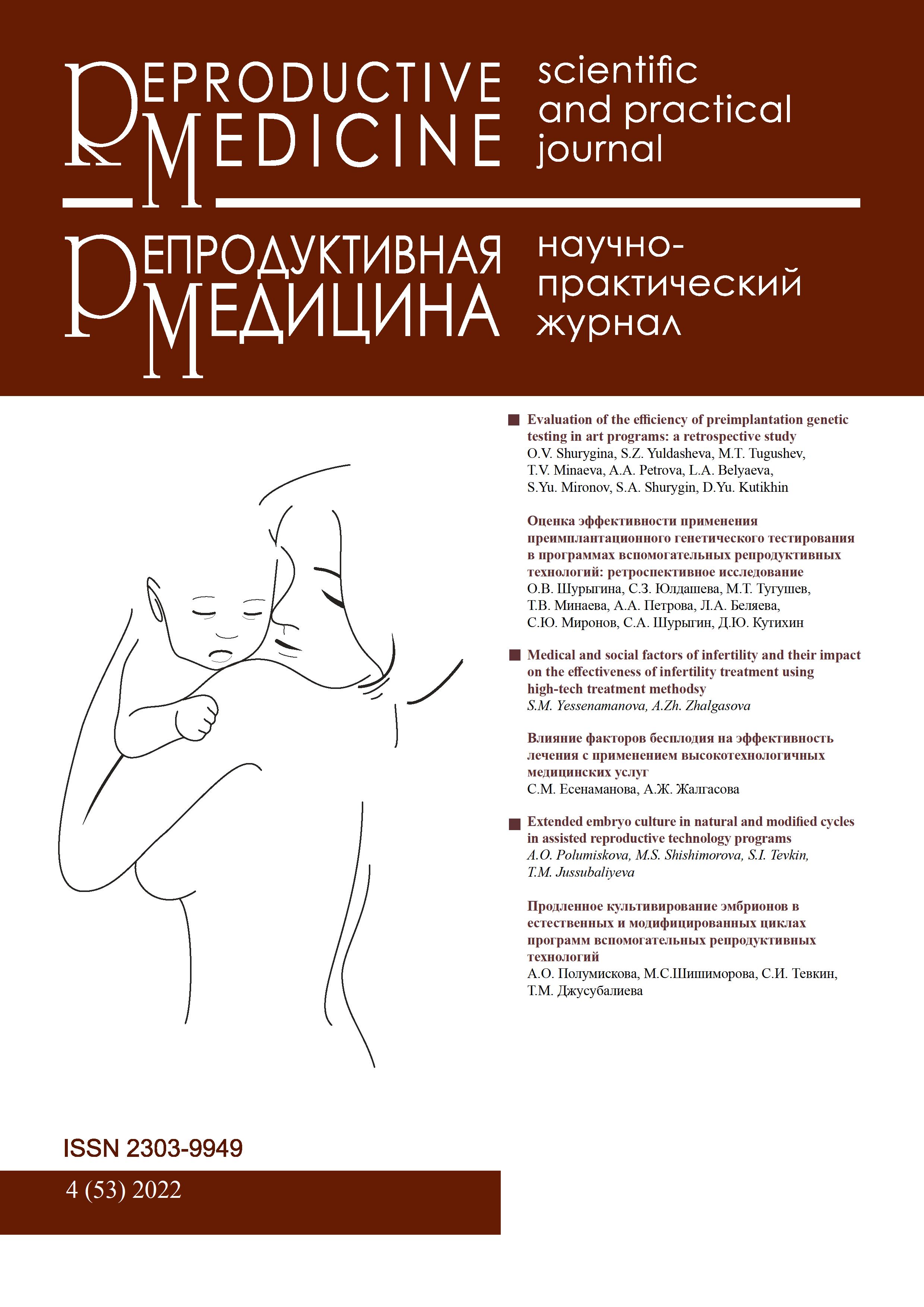Evaluation of the efficiency of preimplantation genetic testing in ART programs: A retrospective study
DOI:
https://doi.org/10.37800/RM.3.2022.32-39Keywords:
embryo, preimplantation genetic testing for aneuploidy (PGT-A), karyotypeAbstract
Relevance: The effectiveness of cycles of assisted reproductive technologies (ART), determined by the frequency of pregnancy, does not exceed 40-44% globally. The growth zone is the application of high-tech methods at the embryological stage of ART programs.The study aimed to evaluate the efficiency of preimplantation genetic testing in ART programs.
Methods: A retrospective analysis involved the results of genetic screening of embryos by Next Generation Sequencing (NGS) in patients of different age groups with the account of anomalies in the patient karyotype.
Results: In the study, the probability of obtaining an embryo with a euploid set of chromosomes decreased with age in patients with a normal karyotype. The proportion of embryos with an aneuploid set of chromosomes was the highest in the oldest
age group (over 40 years old) and amounted to 66.7%. In the structure of karyotype deviations, 6.8% of women and 6.8% of men had changes in the chromosomal status. In couples with a normal karyotype, 42.6% (100 embryos) were recommended for
transfer, and 57.5% (135 embryos) were not recommended. 11.4% (4 embryos) were recommended for transfer among couples with karyotype abnormalities. This was almost four times less than among patients with a normal karyotype. 88.6% (31) of
embryos had chromosomal abnormalities.
Conclusion: Preimplantation genetic testing for aneuploidy (PGT-A) in embryos by new generation sequencing (NGS) makes it possible to achieve pregnancy with a higher probability in patients of older reproductive age with numerical or structural
anomalies of the karyotype.
References
Murphy N.M., Samarasekera T.S., Macaskill L., Mullen J., Rombauts L.J.F. Genome sequencing of human in vitro fertilization embryos for pathogenic variation screening // Sci. Rep. – 2020. – Vol. 10(1). – Art. no. 3795. https://doi.org/10.1038/s41598-020-60704-0
Rocafort E., Enciso M., Leza A., Sarasa J., Aizpurua J. Euploid embryos selected by an automated time-lapse system have superior SET outcomes than selected solely by conventional morphology assessment // J. Assist. Reprod. Genet. – 2018. – Vol. 35(9). – P. 1573-1583. https://doi.org/10.1007/s10815-018-1265-7
Krausz C., Riera-Escamilla A. Genetics of male infertility // Nat. Rev. Urol. – 2018. – Vol. 15(6). – P. 369-384. https://doi.org/10.1038/s41585-018-0003-3
Смирнова А.А., Зыряева Н.А., Жорданидзе Д.О., Сергеев С.А., Матвеева Э.О., Рижинашвили С.И., Торчинов А.Р., Аншина М.Б., Кира Е.Ф. Преимплантационное генетическое тестирование с целью профилактики невынашивания беременности после ЭКО // Репродуктивная медицина. – 2019. – №3(40). – С. 65-71 [Smirnova A.A., Zyryaeva N.A., Zhordanidze D.O., Sergeev S.A., Matveeva E’.O., Rizhinashvili S.I., Torchinov A.R., Anshina M.B., Kira E.F. Preimplantacionnoe geneticheskoe testirovanie s cel’yu profilaktiki nevynashivaniya beremennosti posle E’KO // Reproduktivnaya medicina. – 2019. – №3(40). – S. 65-71 (in Russ.)]. https://repromed.kz/index.php/journal/article/view/116/104
O’Brien K., Varghese A., Agarwal A. The genetic causes of male factor infertility: a review // Fertil. Steril. – 2010. – Vol. 93(1). – P. 1-12. https://doi.org/10.1016/j.fertnstert.2009.10.045
Doroftei B., Ilie O., Anton N., Armeanu T., Ilea C. A Mini-Review Regarding the Clinical Outcomes of In Vitro Fertilization (IVF) Following Pre-Implantation Genetic Testing (PGT)-Next Generation Sequencing (NGS) Approach // Diagnostics. – 2022. – Vol. 12(8). – Art. no. 1911. https://doi.org/10.3390/diagnostics12081911
Downloads
Published
How to Cite
Issue
Section
License
The articles published in this Journal are licensed under the CC BY-NC-ND 4.0 (Creative Commons Attribution – Non-Commercial – No Derivatives 4.0 International) license, which provides for their non-commercial use only. Under this license, users have the right to copy and distribute the material in copyright but are not permitted to modify or use it for commercial purposes. Full details on the licensing are available at https://creativecommons.org/licenses/by-nc-nd/4.0/.




